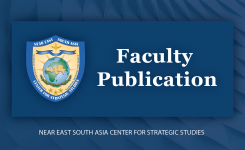- Near East South Asia Center for Strategic Studies
- Faculty Publication: "'Positive Neutralism': Se...
Faculty Publication: "'Positive Neutralism': Security Politics of Vision 2040 in Oman" by Dr. Gawdat Bahgat

NESA Center Professor Dr. Gawdat Bahgat authored a chapter in the Italian Institute for International Political Studies (ISPI) report, The Security Side of Gulf Visions: Adapting Defence to the Connectivity Age, published 25 March 2024.
Introduction:
In the Gulf Cooperation Council (GCC) states, national transformation plans 'beyond hydrocarbons', known as "Visions," also have a still underexplored security dimension and defence side. The GCC states are adapting defence strategies to the challenges raised by their "Visions," their post-hydrocarbon national plans. Far from being just economic programmes, the Visions are broad national transformation platforms displaying also a security dimension, and with many security implications. New cities and industrial poles, infrastructures, mega events and tourism raise unprecedented security risks, at which the GCC states are answering through a combination of economic-oriented foreign policy, multipolar international alliances, and ambitions towards "defense autonomisation." What are the Visions' security dimensions and implications, and how does the post-oil path affect and reshape foreign policies? This report analyzes how GCC states are adapting deterrence and defence tools to the connectivity age, navigating a troubled neighbourhood of both conventional and asymmetric threats. In a central but more vulnerable Gulf, how may the EU and NATO accommodate transformations in GCC states' defense policies, postures, and means, to support their own security?
Professor Bahgat's chapter is titled "Positive Neutralism": Security Politics of Vision 2040 in Oman and starts on page 47.
About the Author

Dr. Gawdat Bahgat is a Professor of National Security Affairs at the National Defense University’s Near East South Asia Center for Strategic Studies. He is an Egyptian-born specialist in Middle Eastern policy, particularly Egypt, Iran, and the Gulf region. His areas of expertise include energy security, proliferation of weapons of mass destruction, counter-terrorism, Arab-Israeli conflict, North Africa, and American foreign policy in the Middle East.
About the Publisher
The Italian Institute for International Political Studies (ISPI) is an independent, non-partisan, non-profit think tank specializing in international affairs and analyzing geographical areas and topics of particular interest to Italy and Europe.
The views presented in this article are those of the speaker or author and do not necessarily represent the views of DoD or its components.


